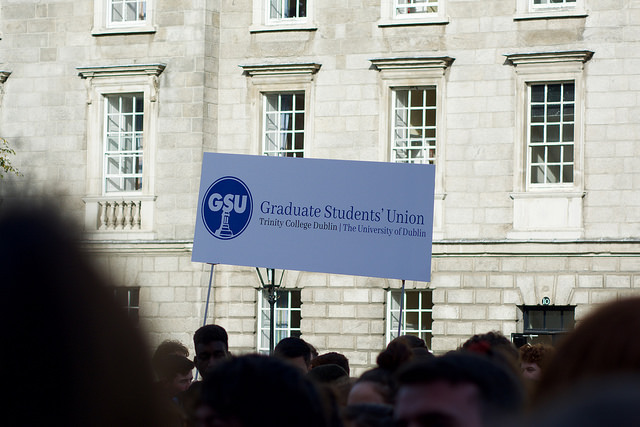American labour activist Samuel Gompers once stated: “Our unions strive to lighten toil, educate their members, make their homes more cheerful, and in every way contribute an earnest effort toward making life the better worth living.” Although the goals mentioned seem to be fair and valid, the question of whether graduate students deserve the right to organise and pursue those goals is still a concern in some areas of the globe. In other places, such as Trinity, the question of whether those goals are being met is at the epicentre of current debate.
The recently proposed increase in postgraduate fees became a focal point at the start of the 2017/2018 academic year, particularly because it has brought into question Trinity’s dedication to, and treatment of, its approximately 5,000 graduate students.
The unwillingness of the Finance Committee to reconsider or compromise has even led to the Graduate Students Union (GSU) in Trinity deliberating on the option of engaging in a university-wide strike, a move which would undoubtedly affect the day-to-day operations of Trinity.
Although it may be argued that graduate students, particularly PhD students, occupy an ambiguous zone somewhere between student and professional, Ireland has settled the issue with the codification into law the right of students to unionize with the 1997 Universities Act.
The fight to unionize had been going on since 1997
The law deals with students in general, but for postgraduate students, many of whom work for their university as teaching or research assistants, the presence of a representative union is a critical factor in ensuring fair and just treatment. That is precisely the reason for the presence of Trinity’s GSU.
The founding of the GSU actually predates the Universities Act, with 1973 recognized as its founding year. President of the GSU Shane Collins counted “pay conditions, teaching hours, and other matters that are as relevant today as they were in 1973” as the primary motivators for the students unionising. He also credited sociocultural factors for providing a fertile ground for the union to flourish: “Labour unions were quite strong. There was a whole collective movement around it, and there was this view that if you unionised and you came together and collectively bargained, that you could get better paying conditions and better conditions in general.”
Coincidentally, the last time that a strike was threatened happened to be in 1973. According to Collins, the face-off ended when Trinity agreed to meet with the GSU “and negotiated improvements to the conditions in which the graduate student workers were working”.

The social environment appears to have a sizeable influence on whether graduate students are recognized as employees and are thus guaranteed the right to collectively bargain. Equally important is the backing of the law. Getting both the law and society on the same page is what has impeded the movement to unionise at universities in the US.
The unique political structure of the US and its system of state and federal laws essentially means that graduate students who are employed at their universities must appeal to the appropriate set of laws to justify unionisation. Students at public universities fall under the jurisdiction of state law, and a number of states have given collective bargaining rights to graduate student employees.
Conversely, a number of states have prohibited university employees, including graduate students, from unionising. For students at private universities, however, it is left up to the federal government to decide whether or not to give graduate student employees collective bargaining rights. While universities such as Cornell, Yale, Harvard and Columbia have seen continued fights between the university administrations and students attempting to unionise, New York University (NYU) decided to recognise its graduate student union, although the decision was anything but a willing one, as it included a failed appeal to the National Labor Relations Board (NLRB) on a 1999 ruling in favour of the union.
We’re getting salaries, we’ve got the responsibilities of an employee, so it doesn’t make any sense to not have the rights of an employee
Emily Rogers, an active member of the Graduate Students Organizing Committee (GSOC) (as a member of the United Auto Workers national union, it is officially abbreviated as GSOC-UAW 2110) at NYU, went into detail on the long and arduous journey the union took in order to finally be recognised: “In 2002 the first contract was ratified but we didn’t actually become a fully recognised union with a bargaining unit and contract until 2015. But the fight to unionize had been going on since 1997.” Echoing Collins’ observation of the importance of social environment, Rogers explained that New York City’s tradition as a labour union stronghold helped in GSOC’s plight for acknowledgement.
Though the city’s history and importance to the labour union movement provided support, GSOC was fighting against a deep-seated preconception of graduate students as, first and foremost, students, a notion that ignored the value of the work the students performed. It is the most popular argument against allowing students the right to unionise, but, according to Rogers, it falls flat when put up against the realities of the graduate student employee experience: “The work that graduate students do is not for course credit. It’s not like this is an internship that we’re doing that’s not paid but being counted for college credit. We’re getting salaries, we’ve got the responsibilities of an employee, so it doesn’t make any sense to not have the rights of an employee.”
Despite a contentious relationship with NYU, Rogers counted a rise in pay, with guaranteed annual increases, health-care subsidies, the waiving of certain administrative fees and the establishment of a childcare fund, as among GSOC’s most hard-fought victories. Additionally, she highlighted conflict resolution as another of the union’s roles, “especially with international students, because in some way they are the most vulnerable to exploitation”.
Due to the intricacies of the US system, the right for students to organise is not guaranteed as it is in Ireland, or perhaps as it is in the UK or the rest of Europe. Students at other private universities in the US have had to navigate shifting political landscapes and the subsequent changes in the legal framework surrounding unions, as well as a lingering anti-union sentiment in certain locales. Even successfully getting through all of that is no guarantee of anything, as the university can simply refuse to bargain with the union, as in the cases of Columbia and Yale.
While the fight just to get recognised is at the forefront of the movement in the US, the issue has already been settled in Europe, for the most part. Collins credited the post-war conception of education in Europe as a right and as “a way of making sure that we have positive social communities who are contributing not only in economic terms but to society at large”. But he feels that Ireland has fallen away from the pack: “We’re losing sight of that because of resource limitations”, he explained, adding that one of the major reasons for this change is the reduction in funding by the government.
The trickle-down effect of this is that Trinity’s GSU has had to take on more functions than a typical labour union. “What has historically happened is that the GSU tends to make up for a gap in provision of certain services and a certain kind of investment in graduate students…we need to make sure that the community of postgrads is treated as well as every other student in the college.”
International students are the most vulnerable to exploitation
The perceived treatment of its constituency, especially when considered in light of what Collins described as a generally good relationship with the university, is a large part of the problem with the proposed increase in postgraduate student fees, and it is why the GSU has seriously considered the option of a strike.
The fact that the fees can even be discussed is a testament to the potential for flexibility in the Irish educational system, as students in the US have no real say in how much tuition a university decides to charge. The most pressing concern facing graduate students in the US in regard to fees is the proposed change in the tax code which will make waived tuition fees taxable income, thereby increasing the tax burden on graduate students.
It is an issue Rogers mentioned as having popped onto the GSOC radar. Again, the argument is that such a change will make an already expensive option even more expensive, and may discourage the next generation of scholars from pursuing advanced degrees. The same can be said of any possible increase in fees. In short, the money is only part of the issue.
Fair and just treatment was, and still is, the goal of labour unions, students’ unions included, and the foundation of this lies in “assurances,” as Collins puts it. It is only natural for people to want to know where they stand and not to be left flailing in the wind. While a union like GSOC, which focuses solely on issues related to students under the direct employment of the university, and one like the GSU, which covers all graduate students, differ in scope, their goal is the same: fighting on behalf of graduate students for the assurances required to pursue education and to improve one’s life.







